熟能生巧英语 熟能生巧的故事的英语翻译
熟能生巧成语故事英语作文

熟能生巧成语故事英语作文The Power of Persistent Practice: A Story of Mastering the Art of PerfectionThe journey towards mastering any skill or craft is often paved with challenges, setbacks, and moments of self-doubt. However, for those who are willing to embrace the power of persistent practice, the path to perfection can be both rewarding and transformative. This is the story of how the timeless idiom "practice makes perfect" came to life, inspiring generations to pursue their passions with unwavering dedication.It all began with a young artist named Emma, whose boundless creativity was matched only by her insatiable desire to hone her craft. From a young age, Emma had been captivated by the beauty and complexity of the visual arts, spending countless hours sketching, painting, and experimenting with various mediums. Yet, despite her natural talent, she often found herself frustrated by the imperfections that plagued her work.One day, as Emma was meticulously studying the masterpieces of the great artists who had come before her, she stumbled upon a quote that would change the course of her artistic journey. "Practice makes perfect," it read, a simple yet profound statement that resonated deeply within her. Emma realized that the key to achieving the level of mastery she so ardently sought lay not in the fleeting moments of inspiration, but in the consistent, disciplined effort she was willing to invest.Fueled by this newfound understanding, Emma set out to put the idiom into practice. She began by dedicating herself to a rigorous daily routine, spending hours in her studio, refining her techniques, and pushing the boundaries of her abilities. At times, the task felt overwhelming, and she found herself questioning whether she had what it took to reach the heights of her artistic dreams.But Emma refused to be deterred. She persevered, embracing each setback as an opportunity to learn and grow. Whenever she encountered a challenge, she would break it down into smaller, manageable steps, focusing on incremental progress rather than perfection. Slowly but surely, her skills began to improve, and she found herself able to create works that captured the essence of her vision with greater clarity and precision.As the years passed, Emma's dedication and hard work began to payoff in remarkable ways. Her paintings were increasingly recognized for their technical mastery and emotional depth, earning her acclaim from critics and collectors alike. But more importantly, she had discovered the true power of the idiom "practice makes perfect" –not as a mere platitude, but as a guiding principle that had transformed her life and her art.Emma's story, however, is not just about her personal journey of artistic growth. It is a testament to the universal truth that lies at the heart of the "practice makes perfect" idiom – that with unwavering commitment and consistent effort, any individual can overcome seemingly insurmountable obstacles and achieve remarkable feats.Whether it's mastering a musical instrument, perfecting a foreign language, or honing a professional skill, the principles that guided Emma's path to success can be applied to a wide range of endeavors. By embracing the mindset of continuous improvement, embracing setbacks as opportunities for growth, and maintaining a relentless focus on the process rather than the end result, individuals can unlock their true potential and achieve levels of mastery that were once thought impossible.Of course, the path to perfection is not without its challenges. There will be moments of frustration, self-doubt, and even burnout. But it is in these moments that the true power of the "practice makesperfect" idiom shines through. By persisting in the face of adversity, by refusing to give up in the face of seemingly insurmountable odds, individuals can tap into a well of resilience and determination that can propel them to new heights of excellence.In the end, the story of Emma and the "practice makes perfect" idiom is a powerful reminder that greatness is not the result of innate talent or luck, but rather the product of unwavering dedication and consistent effort. It is a testament to the transformative power of the human spirit, and a testament to the belief that with the right mindset and the willingness to put in the hard work, anything is possible.So, whether you are an aspiring artist, a budding musician, or a driven professional, let the story of Emma and the "practice makes perfect" idiom be your guide. Embrace the journey, celebrate the small victories, and never lose sight of the power of persistent practice. For it is in the pursuit of perfection that we discover the true depths of our own potential, and unlock the boundless possibilities that lie within us all.。
英语谚语
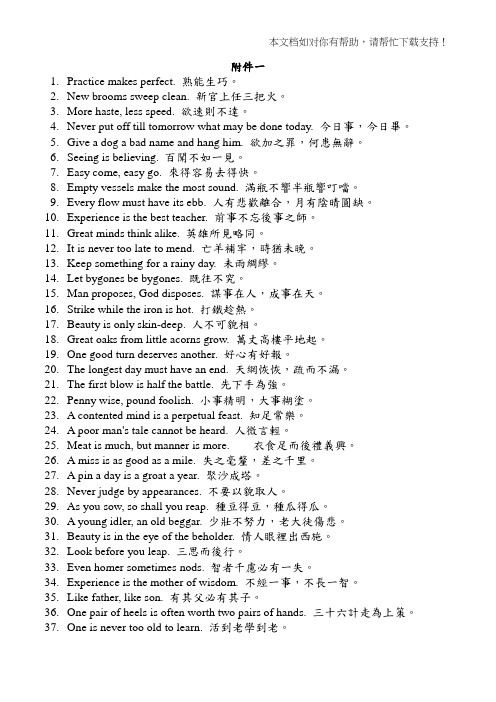
附件一1.Practice makes perfect. 熟能生巧。
2.New brooms sweep clean. 新官上任三把火。
3.More haste, less speed. 欲速則不達。
4.Never put off till tomorrow what may be done today. 今日事,今日畢。
5.Give a dog a bad name and hang him. 欲加之罪,何患無辭。
6.Seeing is believing. 百聞不如一見。
7.Easy come, easy go. 來得容易去得快。
8.Empty vessels make the most sound. 滿瓶不響半瓶響叮噹。
9.Every flow must have its ebb. 人有悲歡離合,月有陰晴圓缺。
10.Experience is the best teacher. 前事不忘後事之師。
11.Great minds think alike. 英雄所見略同。
12.It is never too late to mend. 亡羊補牢,時猶未晚。
13.Keep something for a rainy day. 未雨綢繆。
14.Let bygones be bygones. 既往不究。
15.Man proposes, God disposes. 謀事在人,成事在天。
16.Strike while the iron is hot. 打鐵趁熱。
17.Beauty is only skin-deep. 人不可貌相。
18.Great oaks from little acorns grow. 萬丈高樓平地起。
19.One good turn deserves another. 好心有好報。
20.The longest day must have an end. 天網恢恢,疏而不漏。
21.The first blow is half the battle. 先下手為強。
熟能生巧寓言故事
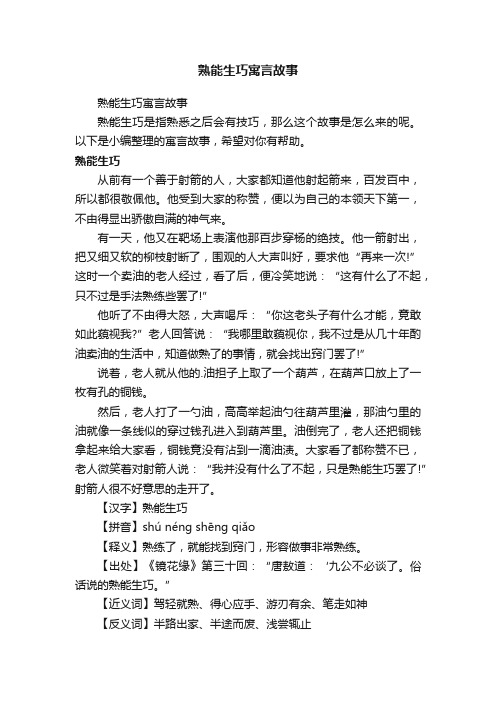
熟能生巧寓言故事熟能生巧寓言故事熟能生巧是指熟悉之后会有技巧,那么这个故事是怎么来的呢。
以下是小编整理的寓言故事,希望对你有帮助。
熟能生巧从前有一个善于射箭的人,大家都知道他射起箭来,百发百中,所以都很敬佩他。
他受到大家的称赞,便以为自己的本领天下第一,不由得显出骄傲自满的神气来。
有一天,他又在靶场上表演他那百步穿杨的绝技。
他一箭射出,把又细又软的柳枝射断了,围观的人大声叫好,要求他“再来一次!”这时一个卖油的老人经过,看了后,便冷笑地说:“这有什么了不起,只不过是手法熟练些罢了!”他听了不由得大怒,大声喝斥:“你这老头子有什么才能,竟敢如此藐视我?”老人回答说:“我哪里敢藐视你,我不过是从几十年酌油卖油的生活中,知道做熟了的事情,就会找出窍门罢了!”说着,老人就从他的.油担子上取了一个葫芦,在葫芦口放上了一枚有孔的铜钱。
然后,老人打了一勺油,高高举起油勺往葫芦里灌,那油勺里的油就像一条线似的穿过钱孔进入到葫芦里。
油倒完了,老人还把铜钱拿起来给大家看,铜钱竟没有沾到一滴油渍。
大家看了都称赞不已,老人微笑着对射箭人说:“我并没有什么了不起,只是熟能生巧罢了!”射箭人很不好意思的走开了。
【汉字】熟能生巧【拼音】shú néng shēng qiǎo【释义】熟练了,就能找到窍门,形容做事非常熟练。
【出处】《镜花缘》第三十回:“唐敖道:‘九公不必谈了。
俗话说的熟能生巧。
”【近义词】驾轻就熟、得心应手、游刃有余、笔走如神【反义词】半路出家、半途而废、浅尝辄止【英文翻译】①Sk ill comes from practice;②Practies makes perfect【寓意】孰能生巧告诉我们,做任何事情,只要肯下功夫,熟练之后,就能掌握窍门。
小朋友们在学习上也是一样的,平时的题目认真的多做多练习,并且不段的去巩固和复习它,这样当我们再次遇到类试的问题时就可以不加思索的给出最准确的答案,而不会像遇到一个新问题那样束手无策!。
熟能生巧的英语谚语

熟能生巧的英语谚语(原创实用版)目录1.谚语的意义和来源2.熟能生巧的科学依据3.熟能生巧在实际生活中的应用4.如何通过练习达到熟能生巧正文一、谚语的意义和来源“熟能生巧”这个谚语来源于古代儒家经典《论语》,原文为“熟能生巧,巧能生精”。
这个谚语传达了一个道理:只有通过不断地练习和积累,才能在某个领域达到精通的境地。
英语中,也有一个与此意思相近的谚语:“Practice makes perfect.”二、熟能生巧的科学依据从心理学的角度来看,熟能生巧是基于大脑神经网络的建立和巩固。
当我们反复练习某个动作或技能时,大脑中的神经元会形成特定的连接,这些连接会随着练习的次数增加而变得更加稳定。
这种神经网络的建立,使得我们在执行某个任务时变得更加熟练和自如。
三、熟能生巧在实际生活中的应用熟能生巧的道理在现实生活中得到了广泛的应用。
例如,学习一门外语,只有通过不断地练习,才能熟练掌握语言技能;运动员要取得好成绩,也需要通过反复训练,才能在比赛中发挥出色。
此外,在音乐、绘画、舞蹈等艺术领域,熟能生巧同样是走向成功的关键因素。
四、如何通过练习达到熟能生巧要想通过练习达到熟能生巧,需要遵循以下几个原则:1.目标明确:确定自己要练习的技能或领域,并设定明确的目标。
2.持续练习:只有通过长时间的持续练习,才能让大脑的神经网络得到充分的建立和巩固。
3.分阶段提高:在练习过程中,要适时调整难度,使自己始终处于“最近发展区”,以实现更高的进步。
4.反馈与调整:在练习过程中,要关注自己的表现,及时发现问题并进行调整。
5.耐心与毅力:熟能生巧的过程可能会很漫长,需要有足够的耐心和毅力去坚持。
总之,熟能生巧这个谚语道出了练习和积累的重要性。
只有通过不断地练习,才能在各个领域取得成功。
熟能生巧谚语英文作文
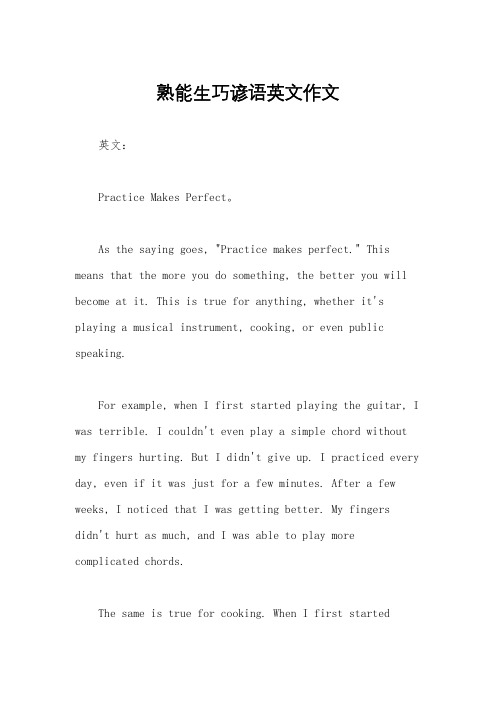
熟能生巧谚语英文作文英文:Practice Makes Perfect。
As the saying goes, "Practice makes perfect." This means that the more you do something, the better you will become at it. This is true for anything, whether it's playing a musical instrument, cooking, or even public speaking.For example, when I first started playing the guitar, I was terrible. I couldn't even play a simple chord without my fingers hurting. But I didn't give up. I practiced every day, even if it was just for a few minutes. After a few weeks, I noticed that I was getting better. My fingersdidn't hurt as much, and I was able to play more complicated chords.The same is true for cooking. When I first startedcooking, I burnt everything. But I kept trying, and eventually, I learned how to cook some delicious meals. Now, I love to cook and experiment with new recipes.In conclusion, the more you practice something, the better you will become at it. Don't give up if you're not good at something right away. Keep practicing, and you will see improvement over time.中文:熟能生巧。
英文作文熟能生巧
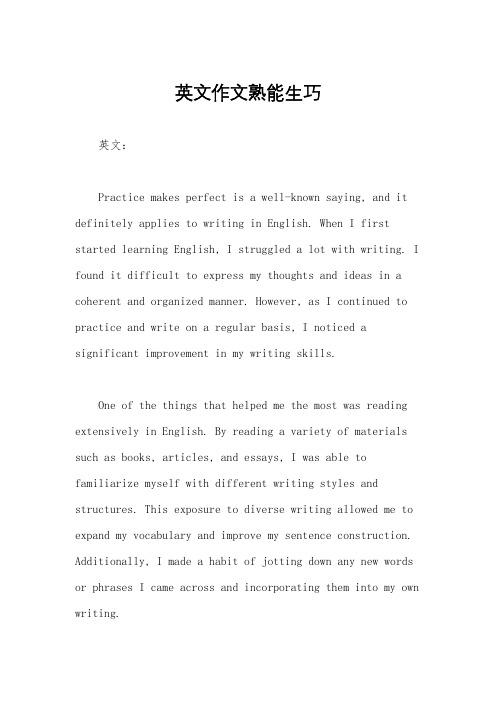
英文作文熟能生巧英文:Practice makes perfect is a well-known saying, and it definitely applies to writing in English. When I first started learning English, I struggled a lot with writing. I found it difficult to express my thoughts and ideas in a coherent and organized manner. However, as I continued to practice and write on a regular basis, I noticed a significant improvement in my writing skills.One of the things that helped me the most was reading extensively in English. By reading a variety of materials such as books, articles, and essays, I was able to familiarize myself with different writing styles and structures. This exposure to diverse writing allowed me to expand my vocabulary and improve my sentence construction. Additionally, I made a habit of jotting down any new words or phrases I came across and incorporating them into my own writing.Another key factor in improving my English writing was receiving feedback from others. Whether it was from teachers, peers, or online communities, I actively sought out constructive criticism to help me identify my weaknesses and areas for improvement. This feedback helped me to refine my writing and make it more effective and impactful.Furthermore, I made it a point to practice writing in different genres and formats. I experimented with writing narratives, persuasive essays, descriptive pieces, and more. This not only helped me to diversify my writing skills but also allowed me to discover my strengths and weaknesses in each type of writing.In addition to all these practices, I also started paying attention to grammar and punctuation. I realizedthat even the most well-crafted piece of writing could be marred by simple grammatical errors. Therefore, I took the time to study grammar rules and punctuation usage, and I practiced applying them in my writing.As I continued to write and practice, I found that my confidence in expressing myself in English grew. I became more comfortable with the language and was able to convey my thoughts and ideas more effectively. With consistent practice, I was able to develop a writing style that was uniquely my own.中文:熟能生巧是一句众所周知的谚语,它绝对适用于英文写作。
【大学英语作文】熟能生巧- Practice Makes Perfect
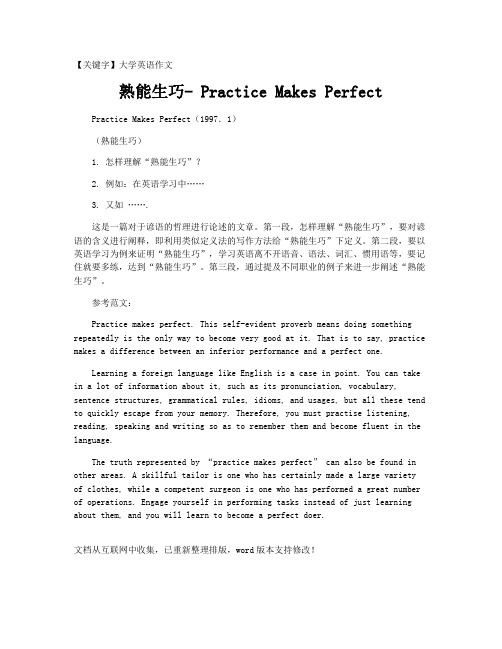
【关键字】大学英语作文熟能生巧- Practice Makes PerfectPractice Makes Perfect(1997.1)(熟能生巧)1. 怎样理解“熟能生巧”?2. 例如:在英语学习中……3. 又如…….这是一篇对于谚语的哲理进行论述的文章。
第一段,怎样理解“熟能生巧”,要对谚语的含义进行阐释,即利用类似定义法的写作方法给“熟能生巧”下定义。
第二段,要以英语学习为例来证明“熟能生巧”,学习英语离不开语音、语法、词汇、惯用语等,要记住就要多练,达到“熟能生巧”。
第三段,通过提及不同职业的例子来进一步阐述“熟能生巧”。
参考范文:Practice makes perfect. This self-evident proverb means doing something repeatedly is the only way to become very good at it. That is to say, practice makes a difference between an inferior performance and a perfect one.Learning a foreign language like English is a case in point. You can take in a lot of information about it, such as its pronunciation, vocabulary, sentence structures, grammatical rules, idioms, and usages, but all these tend to quickly escape from your memory. Therefore, you must practise listening, reading, speaking and writing so as to remember them and become fluent in the language.The truth represented by “practice makes perfect” can also be found in other areas. A skillful tailor is one who has certainly made a large variety of clothes, while a competent surgeon is one who has performed a great number of operations. Engage yourself in performing tasks instead of just learning about them, and you will learn to become a perfect doer.文档从互联网中收集,已重新整理排版,word版本支持修改!。
英语常用谚语
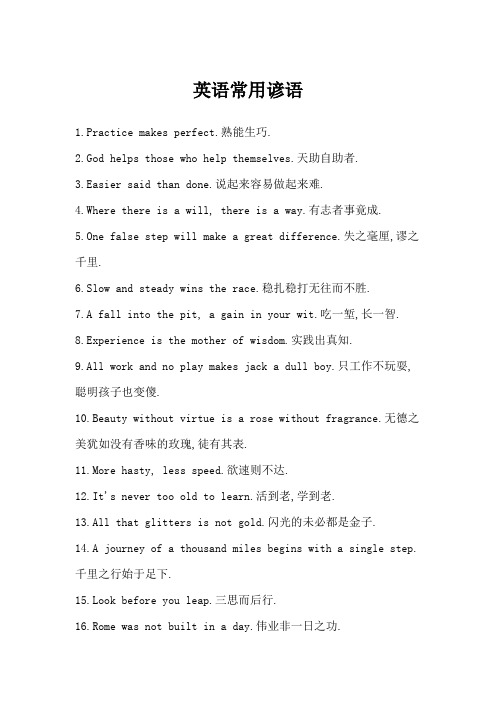
英语常用谚语1.Practice makes perfect.熟能生巧.2.God helps those who help themselves.天助自助者.3.Easier said than done.说起来容易做起来难.4.Where there is a will, there is a way.有志者事竟成.5.One false step will make a great difference.失之毫厘,谬之千里.6.Slow and steady wins the race.稳扎稳打无往而不胜.7.A fall into the pit, a gain in your wit.吃一堑,长一智.8.Experience is the mother of wisdom.实践出真知.9.All work and no play makes jack a dull boy.只工作不玩耍,聪明孩子也变傻.10.Beauty without virtue is a rose without fragrance.无德之美犹如没有香味的玫瑰,徒有其表.11.More hasty, less speed.欲速则不达.12.It's never too old to learn.活到老,学到老.13.All that glitters is not gold.闪光的未必都是金子.14.A journey of a thousand miles begins with a single step.千里之行始于足下.15.Look before you leap.三思而后行.16.Rome was not built in a day.伟业非一日之功.17.Great minds think alike.英雄所见略同.18.well begun,half done.好的开始等于成功的一半.19.It is hard to please all.众口难调.20.Out of sight, out of mind.眼不见,心不念.21.Facts speak plainer than words.事实胜于雄辩.22.Call back white and white back.颠倒黑白.23.First things first.凡事有轻重缓急.24.Ill news travels fast.坏事传千里.25.A friend in need is a friend indeed.患难见真情.26.live not to eat, but eat to live.活着不是为了吃饭,吃饭为了活着.27.Action speaks louder than words.行动胜过语言.28.East or west, home is the best.金窝银窝不如自家草窝.29.It's not the gay coat that makes the gentleman.君子在德不在衣.30.Beauty will buy no beef.漂亮不能当饭吃.31.Like and like make good friends.趣味相投.32.The older, the wiser.姜是老的辣.33.Do as Romans do in Rome.入乡随俗.34.An idle youth, a needy age.少壮不努力,老大徒伤悲.35.As the tree, so the fruit.种瓜得瓜,种豆得豆.36.To live is to learn, to learn is to better live.活着为了学习,学习为了更好的活着.37.More hasty, less speed. 欲速则不达38.It's never too old to learn. 活到老,学到老。
- 1、下载文档前请自行甄别文档内容的完整性,平台不提供额外的编辑、内容补充、找答案等附加服务。
- 2、"仅部分预览"的文档,不可在线预览部分如存在完整性等问题,可反馈申请退款(可完整预览的文档不适用该条件!)。
- 3、如文档侵犯您的权益,请联系客服反馈,我们会尽快为您处理(人工客服工作时间:9:00-18:30)。
熟能生巧英语熟能生巧的故事的英语翻译各位读友大家好,此文档由网络收集而来,欢迎您下载,谢谢
只有通过实践才能善于做的事情、写流利来,而且在其他各界人士. Only when you do more practice can you make things perfect. Through practice。
这不仅适用于我们的学习。
只有当你做更多的实践你能完美的东西帮楼上翻译一下并改正
There is an old saying in China。
熟能生巧英语
熟能生巧。
实践是一种手段和完善是一个目标。
熟能生巧英语实践使我们能够正确拼写单词. This is true not only in our learning but also in other walks of life.
另一个例子是烹饪。
以英国为例的研究。
一个人要准确流利地说英语没有大量的实践是几乎不
可能的, why not put it into practice,掌握语法规则和惯例也很快使我们他说?
中国有句古话:熟能生巧. Practice enables us to spell words correctly and master the rules of grammar quickly and practice also makes us he come fluent in speaking and writing: Practice makes perfect,这是肯定的。
既然我们已经意识到实践的重要性,为什么不付诸实践呢各位读友大家好,此文档由网络收集而来,欢迎您下载,谢谢。
